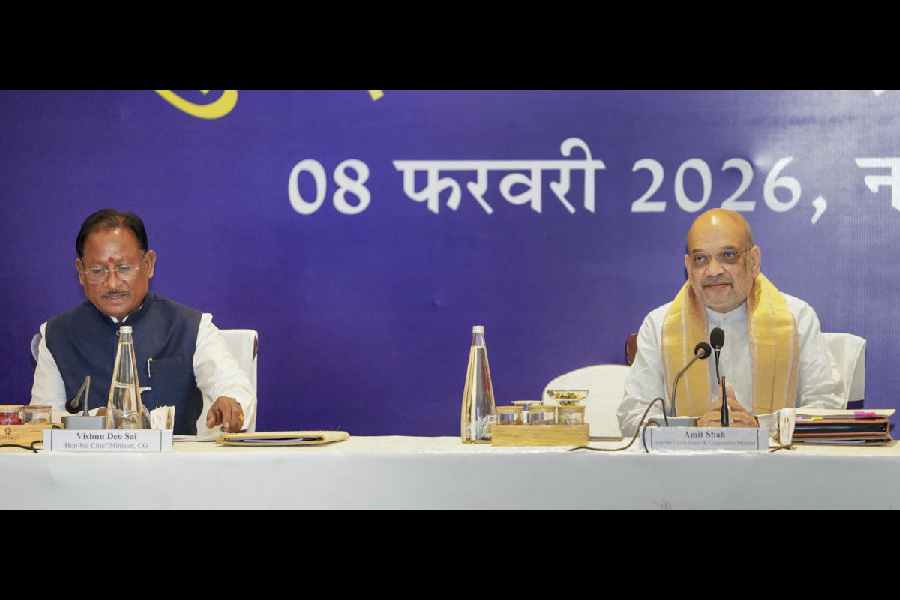
V.S. Naipaul documented the migrations of peoples, the unravelling of the British Empire, the ironies of exile and the clash between belief and unbelief in more than a dozen unsparing novels and as many works of non-fiction.
In many ways embodying the contradictions of the postcolonial world, Naipaul was born of Indian ancestry in Trinidad, went to Oxford University on a scholarship and lived the rest of his life in England, where he forged one of the most illustrious literary careers of the last half-century. He was knighted in 1990.
Compared in his lifetime to Conrad, Dickens and Tolstoy, he was also a lightning rod for criticism, particularly by those who read his portrayals of third-world disarray as apologies for colonialism.
Yet Naipaul exempted neither coloniser nor colonised from his scrutiny. He wrote of the arrogance and self-aggrandisement of the colonisers, yet exposed the self-deception and ethical ambiguities of the liberation movements that swept across Africa and the Caribbean in their wake. He brought to his work moral urgency and a novelist's attentiveness to individual lives and triumphs.
Naipaul personified a sense of displacement. Having left behind the circumscribed world of Trinidad, he was never entirely rooted in England.
Yet his existential homelessness was as much willed as fated. Although he spent his literary career mining his origins, Naipaul fiercely resisted the idea of being tethered to a hyphen, or to a particular ethnic or religious identity. He once left a publisher when he saw himself listed in the catalogue as a "West Indian novelist". A Hindu, though not observant, Naipaul was a staunch defender of western civilisation. His guiding philosophy was universalism.
"What do they call it? Multi-culti? It's all absurd, you know," he said in 2004. "I think if a man picks himself up and comes to another country, he must meet it halfway." It was the kind of provocative statement that won him both enemies and admirers over the years.
An often difficult man with a fierce temper who dressed sedately in tweed jackets, Naipaul had a face of hawk-like severity. If displeased by questions, Naipaul would sometimes walk out on public appearances and hang up on journalists. Although he could be mischievous and had a deep sense of humour, he was prone to melancholy.
Naipaul practised yoga until his back grew too weak, and often lamented that writing took a physical toll. He would spend months cogitating at home in London or more often in his book-filled cottage in the Wiltshire countryside, outside Salisbury, which he shared with his first wife and later his second, and with a black-and-white cat named Augustus.
He continued to write novels even after declaring the form a 19th-century relic. Yet his fiction was always in conversation with his non-fiction; each new book built on the ones that came before.
Naipaul wrote relatively slowly, sometimes only a paragraph a day, and was intensely protective of his work. Diana Athill, who edited 19 of his books at the London publisher Andre Deutsch between the 1950s and the 1970s, said editing Naipaul involved providing him with much reassurance.
"You didn't actually ever have to do a single thing to any of his books," Athill told The New Yorker in 1994. "But you did have to do a lot of attempting to cheer him up, because he would deliver a book and he would be happy when he delivered it, and then really soon he would go into a pit: 'What is the point? What is the point of writing books? I'm never going to write another book.'"
Ancestry in India
Vidiadhar Surajprasad Naipaul was born on August 17, 1932, in Chaguanas, Trinidad, where his paternal grandfather had emigrated from India in the 1880s as an indentured servant to work on the sugar plantations.
His father, Seepersad, was a newspaper reporter for The Trinidad Guardian and an aspiring fiction writer who as a child was luckily allowed to go to school; his older brother was sent to work in the cane fields for eight cents a day and his sister remained illiterate. His mother, Droapatie Capildeo, was from a large, prosperous family, and when Naipaul was six, the family moved in with them in a big house in Port of Spain.
The second of seven children, he was particularly close to his older sister, Kamla. His younger and only brother, Shiva, who was also a novelist, died in 1985.
Educated in English schools in Trinidad, Naipaul said he owed his writing ambitions to his father, who read to him, among other things, from Booker T. Washington's Up From Slavery.
His first years in England in the 1950s were full of panic and anxiety. In 1952, while at University College, Oxford, he had a mental breakdown.
"Before I became secure as a writer, it was a long, unbroken period of melancholy," he told The New Yorker in 1994.
From 1954 to 1956, he edited a radio programme on literature for the British Broadcasting Corporation's Caribbean Service. His voice was perfect for the airwaves - rich and mellowed by tobacco. His crisp English accent had a slight Caribbean twist, and he often repeated phrases for emphasis. "I speak 130 words a minute," he told The New York Times in 2005. "I know this precisely from my radio days."
It was in 1954, while toiling in the old Edwardian-Victorian hotel that housed the BBC freelancer's office, that Naipaul began writing fiction.
"To become a writer, that noble thing, I had thought it necessary to leave," he wrote elsewhere. "Actually to write, it was necessary to go back. It was the beginning of self-knowledge."
His first novel, The Mystic Masseur (1957), about Ganesh Ramsumair, a failed schoolteacher who becomes a masseur and later guru and politician in Trinidad, was well received.
Ferociously prolific, Naipaul published a book every year or two for much of his career. His breakthrough was his joyous, deeply autobiographical fourth novel, A House for Mr. Biswas (1961). Set in Trinidad, it is the story of a middle-aged journalist's efforts to free himself of his dependence on his wife's wealthier, domineering family and lay claim to his own corner of the world.
Written when he was not yet 30, the book cemented Naipaul's standing among the most important writers of his generation; writing in The Times in 1971, Nadine Gordimer, the South African novelist and later a fellow Nobel laureate, called it "magnificent". It was eventually published by the Modern Library of 20th-century classics.
In 1955 Naipaul married Patricia Hale, an Englishwoman he had met at Oxford. The two were extremely close - she read all his work in progress - but their relationship was puzzling to outsiders, many of whom saw her as self-effacing and subservient. Although she often travelled with Naipaul, Hale is mentioned only once in his books, and not by name. The couple never had children.
His childlessness, he told The New Yorker in 1994, "really comes from a detestation of the squalling background of children that I grew up with in my extended family". He also confessed that he had been "a great prostitute man" in the early years of his marriage and acknowledged that in the 1970s he had fallen in love with an Anglo-Argentine woman who became his long-time mistress.
After Hale died of cancer in 1996, Naipaul dedicated a new edition of A House for Mr. Biswas to her memory.
In 1996, two months after the death of his first wife, Naipaul married Nadira Khannum Alvi, a divorced Pakistani journalist more than 20 years his junior.
Non-fiction years
Naipaul began writing non-fiction in the 1960s. "I thought non-fiction gave one a sense to explore the world, the other world, the world one didn't know fully," he said in 2005. "I thought if I didn't have this resource of non-fiction I would have dried up perhaps. I'd have come to the end of my material."
For his first non-fiction book, The Middle Passage (1962), Naipaul returned to the West Indies. He charted inter-island racial tensions in Trinidad; analysed the cultural "mimicry" he saw as central to colonial identity; questioned how the region, then on the brink of self-rule, would govern itself; and observed that the smaller Caribbean islands "in the name of tourism, are selling themselves into a new slavery".
Some found his portrayal distasteful. Derek Walcott, the Caribbean-born poet and winner of the 1992 Nobel Prize in Literature, called him "V.S. Nightfall" in a poem, and said his prose was scarred by his "repulsion towards Negroes" and the "self-disfiguring sneer that is praised for its probity". Yet Walcott was pleased when Naipaul won the Nobel Prize. "It will mean something for the region," he told The Guardian.
In 1964, Naipaul published the first of three travelogues about India, An Area of Darkness. He found that in spite of his Indian origins, he did not belong there at all.
"No other country was more fitted to welcome a conqueror; no other conqueror was more welcome than the British," he wrote. "While dominating India they expressed their contempt for it, and projected England; and Indians were forced into a nationalism which in the beginning was like a mimicry of the British."
Naipaul began to travel in Africa in the 1970s. His collection In a Free State, from 1971, about a gay English civil servant and a "compound wife" who take a road trip through an unnamed African country that closely resembles Idi Amin's Uganda, won the Booker Prize that year.
Always attuned to the tides of history, Naipaul began to travel in non-Arab Islamic countries around the time of the Islamic Revolution in Iran. He visited Iran, Pakistan and Malaysia in the late 1970s, when they were witnessing a rise in political power and Islamic fundamentalism. His first travelogue, Among the Believers, was published in 1981. A sequel, Beyond Belief, followed in 1998.
He started his inquiry, he later explained, by asking simple questions: To what extent had "people who lock themselves away in belief shut themselves away from the active, busy world?" "To what extent without knowing it" were they "parasitic on that world"? And why did they have "no thinkers to point out to them where their thoughts and their passion had led them?"
The books are grounded in Naipaul's belief that Islamic societies lead to tyranny.
These books were harshly criticised. The critic and Palestinian rights advocate Edward Said argued that Naipaul had interviewed only those who would confirm his pre-established thesis about flaws in Islam while playing down local political situations that might better explain the rise in Islamic fundamentalism.
New York Times News Service










